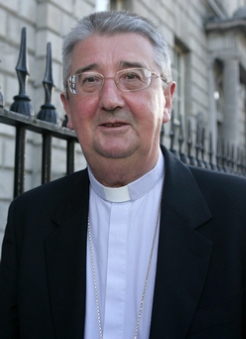|
Church faces more serious matters than media scrum over Maynooth
By Fr Seán Mcdonagh
In recent times, I have been writing about climate change and how Ireland is not living up to its obligations. The situation is very serious. Scientists are telling us that 2015 was the hottest year on record and that 2016 is expected to be even warmer. The issue will lead to the death and displacement of millions of people, but unfortunately our media and politicians have been slow to grapple with it in an effective and competent way. It is only very recently that the leadership of the Catholic Church has begun to take the environmental degradation of the planet seriously. In June 2015, Pope Francis published an extraordinary encyclical on the care of creation, entitled 'Laudato Si: On Care For Our Common Home'. So could it be that Ireland and the Catholic Church might finally be discussing this document in August 2016? Alas, no. But in the social and economic sphere, we also face other serious challenges today. Research by Oxfam Ireland has pointed out that the share of income going to workers has fallen as the size of the global economy more than doubled over the past three decades. Furthermore, it confirms that this is the most unequal country in the EU in terms of income distribution. These are very difficult times, especially for young people. Maybe the Irish public and the Catholic Church in Ireland are busy discussing zero-hour contracts, in which people are obliged to be available for work, even if they are not called into work today. Sadly, once again, the answer would seem to be no. Rather than discussing some of the important themes I have mentioned above, Archbishop Diarmuid Martin decided to inform the public that he had made up his mind not to send his three seminarians to Maynooth because he was disturbed by rumours about a poisonous atmosphere. One wonders did Dr Martin realise that August is traditionally the silly season for the media and that his announcement would inevitably lead to a deluge of coverage about the suitability of Maynooth as a training centre for seminarians. The tsunami of invective and gleeful nods and winks that has resulted from his announcement was an embarrassment for the Catholic Church in Ireland. The president of Maynooth, Monsignor Hugh Connelly, was pursued by RTÉ's Keelin Shanley in an interview on August 5. He made it perfectly clear that allegations are not facts and that he and the college's formation staff had difficult decisions to make when assessing whether (or not) someone has a vocation to the priesthood. Allegations need to be investigated. However, in our legal system, those against whom allegations are made are innocent until proved guilty. Making these assessments as to whether or not a person is suitable or unsuitable for taking up ministry in the priesthood is a very difficult task. People who have very rigid moral or theological views, or who are committed to a pre-Vatican II vision of the church, are often not suitable for parish ministry in the contemporary church. This does not mean that they cannot have very productive, creative and fulfilling lives within the Catholic Church. Fr Brendan Hoban of the Association of Catholic Priests warned that Archbishop Diarmuid Martin's decision would have far-reaching consequences, not just for Maynooth but also for the Catholic Church in Ireland. He also stated that Archbishop Martin's arguments about moving students to Rome "are not convincing". Fr Hoban went on to make it clear that many of participants in the media scrum that was triggered by Archbishop Martin's comments have a particular vision of the kind of church that they want to see promoted in Ireland today. Michael Kelly, editor of 'The Irish Catholic', referred to the Association of Catholic Priests (ACP) as "left-wing". This is not meant as a compliment, but labelling people is hardly a way to conduct a serious discussion. I am proud of the fact that during the 1970s and 1980s I was involved with the justice and peace ministry of the Mindanao-Sulu pastoral council in the Philippines. I witnessed the extraordinary courage of lay people who took decisions, often at huge risk to their own lives, to protect the well-being of people on the margins of society. During the past 35 years, I have been involved in developing the Care of Creation ministry in the Catholic Church. For me, these initiatives are consistent with the Sermon on the Mount in St Matthew's Gospel. On the issue of ministry, the ACP has been pointing out for the past five years that priestly ministry is collapsing in Ireland. There are 1.2 million Catholics in the Archdiocese of Dublin, yet Archbishop Martin is talking about transferring a mere three seminarians to Rome. We need a completely new structure of ministry in the Catholic Church in Ireland if we wish to have the Eucharist available to us in the future and have competent pastoral care for everyone. Finally, I was amazed that during all the of the controversy which ensued during the week, nobody mentioned three of the most significant documents of the modern church - 'The Joy of the Gospel', 'Laudato Si': On Care For Our Common Home', and 'The Joy of Love'. These are pivotal documents in the modern church and yet they were missing from the debate. I look forward to the day when the media - if they are genuinely interested in the future of the Irish church - will afford the same time, interest and energy to discussing the latter as they have to the Maynooth story.
|
.
Any original material on these pages is copyright © BishopAccountability.org 2004. Reproduce freely with attribution.
